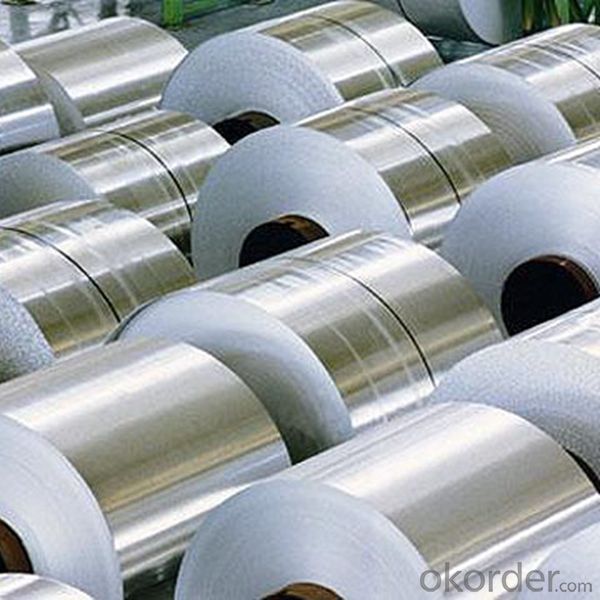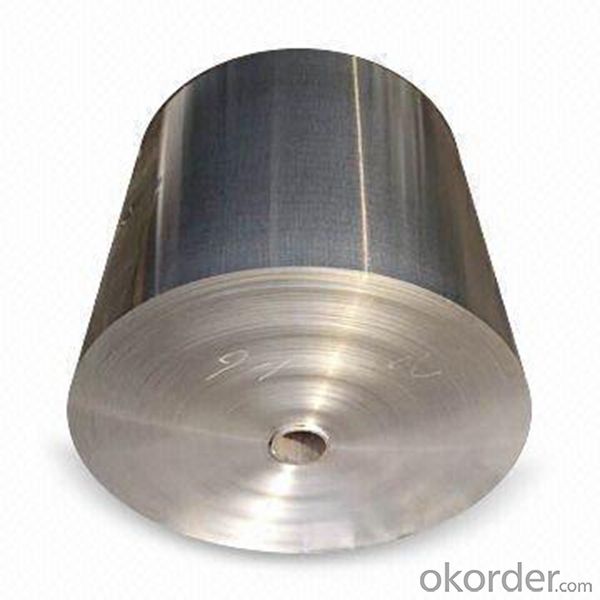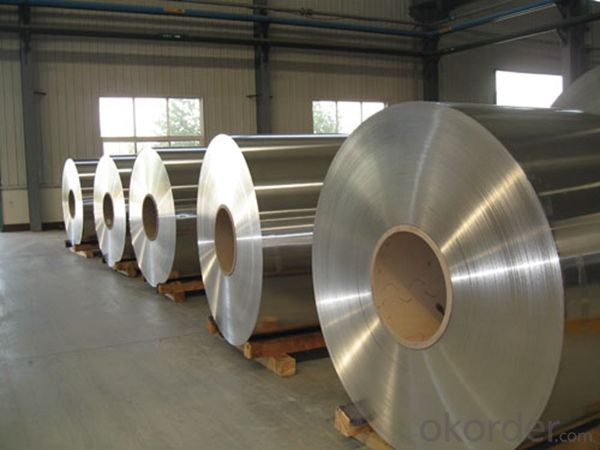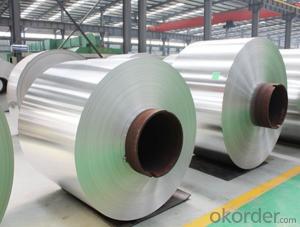Hot Rolled Coil Aluminium Cold Rolled Coil Thick Foil
- Loading Port:
- Shanghai
- Payment Terms:
- TT OR LC
- Min Order Qty:
- 5 m.t.
- Supply Capability:
- 10000 m.t./month
OKorder Service Pledge
OKorder Financial Service
You Might Also Like
Item specifice
1. Specification of Hot Rolled Coil Aluminium Cold Rolled Coil Thick Foil
characteristics | Application |
1) Super peeling strength | 1) Building exterior curtain walls |
2) Excellent surface flatness and smoothness | 2) Decoration and renovation additions for old buildings |
3) Superior weather, corrosion, pollutant resistance | 3) Decoration of interior walls, ceilings, bathrooms, kitchens and balconies |
4) Even coating, various colors | 4) Shop door decorations |
5) Fireproof, excellent heat and sound insulation | 5) Advertisement board display platforms and signboards |
6) Superior impact resistance | 6) Wallboards and ceilings for tunnels |
7) Lightweight and easy to process | 7) Industrial materials, materials for vehicles and boats |
2. Application of Hot Rolled Coil Aluminium Cold Rolled Coil Thick Foil
(1).Interior: wall cladding, ceilings, bathrooms, kitchens and balconies, shutters, doors...
(2).Exterior: wall cladding, facades, roofing, canopies, tunnels,column covers , renovations...
(3).Advertisement: display platforms, signboards, fascia, shop fronts...
3. Feature of Hot Rolled Coil Aluminium Cold Rolled Coil Thick Foil
*Such coil is specially designed to replace aluminum ingot, due to the high export tax of aluminum ingot, the coil has better price than ingot.
*This type of coil can fit customer's remelting furnace just like ingot, no need to make any change to the production line that was previously used for ingot. The standard coil size and weight is very suitable for the feed gate of furnace.
*This type of coil causes less material wastage than ingot when remelted.
*Our coil is made directly from ore, no need to go though the ingot making process, quality is much better than other suppliers who use ingot scrap to make coil.
Be free from Oil Stain, Dent, Inclusion, Scratches, Stain, Oxide Dicoloration, Breaks, Corrosion, Roll Marks, Dirt Streaks and other defect which will interfere with use
4. Certificate:
SGS and ROHS(if client request, paid by client), MTC(plant provided), Certificate of Origin(FORM A, FORM E, CO), Bureau Veritas and SGS (if client request, paid by client), CIQS certificate
5. Image of Hot Rolled Coil Aluminium Cold Rolled Coil Thick Foil



6. Package and shipping of Hot Rolled Coil Aluminium Cold Rolled Coil Thick Foil
eye to wall
eye to the wall
with wood pallet (wooded case also available)
7. FAQ
1) What is the delivery time?
Dpends on actual order, around 20 to 35 days
2)What is the QC system:
We have QC staff of 20 persons and advanced equipment, each production is with MTC traced from Aluminum ingot lot.
3) What market do you mainly sell to?
Australia, America, Asia, Middle East, Western Europe, Africa etc
- Q:How much cube is the 0.9mm aluminum rolling?
- This is a common problem. Anyone who had received high school education can calculate it very quickily. One way is to calculate sectional area with circular area, then times the thickness of the aluminum rolling. Another way is to use the outer diameter circular area to subtract the core area and then times the thickness of aluminum rolling.
- Q:How do aluminum coils contribute to the reduction of carbon footprint?
- Aluminum coils contribute to the reduction of carbon footprint by being lightweight, durable, and recyclable. Their lightweight property reduces fuel consumption during transportation, resulting in lower greenhouse gas emissions. Additionally, aluminum coils have a longer lifespan and require less maintenance, reducing the need for frequent replacements and associated carbon emissions. Finally, aluminum is highly recyclable, meaning that when coils reach their end of life, they can be easily recycled into new products, further reducing the carbon footprint associated with their production.
- Q:Can aluminum coils be used in electrical busbars?
- Yes, aluminum coils can be used in electrical busbars. Aluminum is a commonly used material for busbars due to its high electrical conductivity, low cost, and lightweight properties. Aluminum coils can be easily formed into various shapes and sizes to fit specific busbar requirements. Additionally, aluminum has good thermal conductivity, which allows for efficient heat dissipation in high current applications. However, it is important to consider the current carrying capacity, mechanical strength, and corrosion resistance of aluminum coils when selecting them for busbar applications.
- Q:Can aluminum coils be used for food processing equipment?
- Food processing equipment can indeed utilize aluminum coils. The reason behind the popularity of aluminum in this context lies in its remarkable thermal conductivity, resistance to corrosion, and lightweight properties. The food industry heavily relies on aluminum for a variety of applications, including heat exchangers, evaporators, and condensers. Specifically engineered to effectively transfer heat and uphold a consistent temperature, aluminum coils prove to be ideal for food processing equipment that demands precise temperature control. Moreover, aluminum is a non-toxic material, guaranteeing that it does not contaminate the processed food. Consequently, aluminum coils establish themselves as a dependable and secure choice for food processing equipment.
- Q:Can aluminum coils be used in electrical applications?
- Yes, aluminum coils can be used in electrical applications. Aluminum is often used as a conductor in electrical wiring due to its high conductivity and low cost compared to copper. Aluminum coils are commonly used in transformers, motors, generators, and other electrical equipment. However, it is important to note that aluminum has a lower electrical conductivity than copper, so larger aluminum coils may be required to achieve the same level of conductivity. Additionally, aluminum coils may require special insulation and connectors to prevent corrosion and ensure proper electrical connections.
- Q:Can aluminum coils be used in curtain wall systems?
- Curtain wall systems can indeed incorporate aluminum coils. The lightweight property, durability, and resistance to corrosion make aluminum a favored material for curtain walls. Shaping and forming aluminum coils is a simple task, enabling the creation of desired profiles for these systems. Moreover, aluminum offers a broad spectrum of colors and finishes, allowing for customization and design adaptability. The utilization of aluminum coils in curtain wall systems also presents energy efficiency advantages, thanks to the commendable thermal conductivity properties of aluminum. In summary, aluminum coils are a fitting and widely employed material for constructing curtain wall systems.
- Q:Can aluminum coils be anodized?
- Yes, aluminum coils can be anodized. Anodizing is a process of enhancing the natural oxide layer on the surface of aluminum to create a more durable and corrosion-resistant coating.
- Q:Can aluminum coils be used in HVAC heat exchangers?
- Yes, aluminum coils can be used in HVAC heat exchangers. Aluminum is a popular choice for heat exchangers due to its excellent thermal conductivity, light weight, and corrosion resistance. Aluminum coils are often used in air conditioning systems and heat pumps, where they transfer heat efficiently between the refrigerant and the surrounding air. Additionally, aluminum coils are easier to shape and form, allowing for more intricate designs and better heat transfer performance. Overall, aluminum coils are a reliable and effective choice for HVAC heat exchangers.
- Q:Can aluminum coils be used in automotive body panels?
- Automotive body panels can indeed utilize aluminum coils. Being both lightweight and corrosion-resistant, aluminum proves to be a suitable material for automotive purposes. The employment of aluminum coils in body panels yields numerous benefits, such as enhanced fuel efficiency owing to the reduced vehicle weight, improved handling and maneuverability, and increased durability. Moreover, aluminum boasts high recyclability, rendering it an environmentally conscious alternative for automotive production. Numerous automakers have already begun integrating aluminum coils into their vehicles, and this trend is anticipated to persist as the industry aims for lighter and more environmentally sustainable automobiles.
- Q:What are the different protective coatings available for aluminum coils?
- Some of the different protective coatings available for aluminum coils include polyester, PVDF (polyvinylidene fluoride), epoxy, and acrylic coatings. These coatings help to enhance the durability and resistance of the aluminum against corrosion, UV rays, and harsh weather conditions.
1. Manufacturer Overview |
|
|---|---|
| Location | |
| Year Established | |
| Annual Output Value | |
| Main Markets | |
| Company Certifications | |
2. Manufacturer Certificates |
|
|---|---|
| a) Certification Name | |
| Range | |
| Reference | |
| Validity Period | |
3. Manufacturer Capability |
|
|---|---|
| a)Trade Capacity | |
| Nearest Port | |
| Export Percentage | |
| No.of Employees in Trade Department | |
| Language Spoken: | |
| b)Factory Information | |
| Factory Size: | |
| No. of Production Lines | |
| Contract Manufacturing | |
| Product Price Range | |
Send your message to us
Hot Rolled Coil Aluminium Cold Rolled Coil Thick Foil
- Loading Port:
- Shanghai
- Payment Terms:
- TT OR LC
- Min Order Qty:
- 5 m.t.
- Supply Capability:
- 10000 m.t./month
OKorder Service Pledge
OKorder Financial Service
Similar products
New products
Hot products
Hot Searches
Related keywords




























